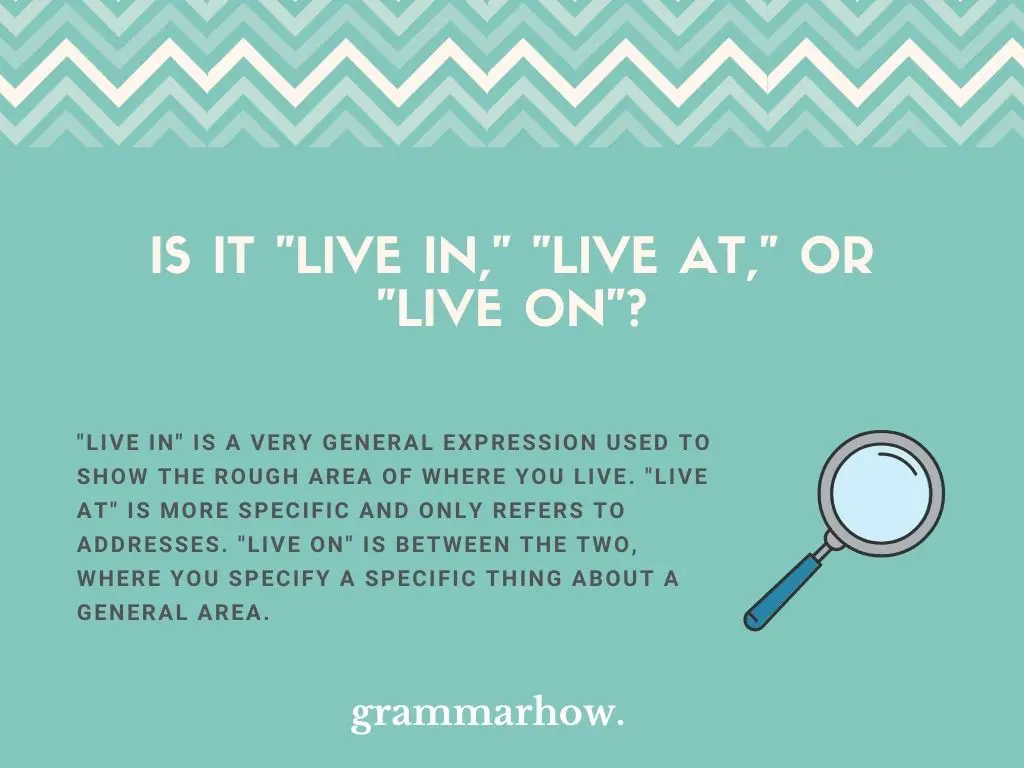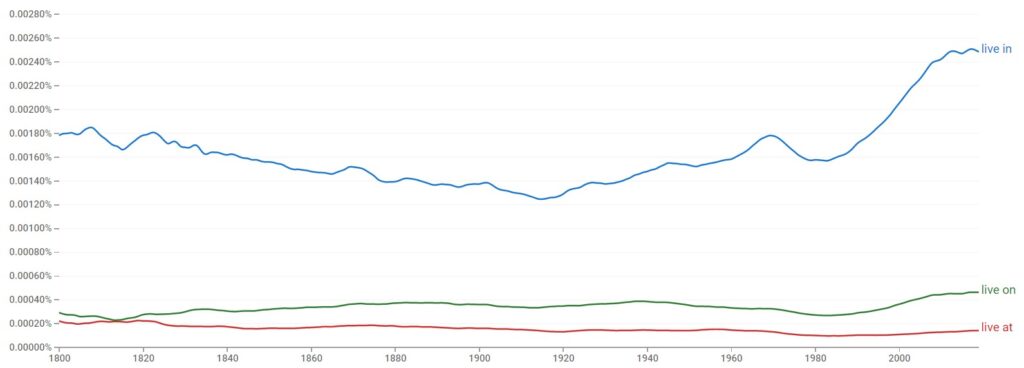Prepositions and verbs interact in very specific ways. Different prepositions are required at different times to talk about specific engagements. This article will explain how “live in,” “live at,” and “live on” differ from each other (and how you can use them).
Is It “Live In,” “Live At,” or “Live On”?
“Live in” is a very general expression used to show the rough area of where you live. “Live at” is more specific and only refers to addresses. “Live on” is between the two, where you specify a specific thing about a general area.

It might help to see some examples that show you how the three work differently. We’ll order them by specificity, and we’ll start with the most general one:
- I live in the country.
- I live on the corner of the new estate.
- I live at 95 Woodchurch Avenue.
As you can see, “in” is the most general and refers to an area. “On” is the next most specific, referring to a specific thing within a more general area. “At” is the most specific, referring only to a specific area.
What Does “Live In” Mean?
“Live in” works when you’re being general about where you live. If you don’t want to specify your exact address and simply show that you’re from a country, city, or something else general, “live in” works best.
- I like living in France. I think it’s where I belong, and I would never leave.
- You should live in the country with me. It’s got all the nicest walks.
- I live in the city. I like it there, but I do find it can be quite busy.
- You live in the south, right? I’m sure I’ve seen you walking around down there a few times.
- I don’t want to live in the forest with her. I think it’s such a terrible place to raise a family.
What Does “Live At” Mean?
“Live at” refers to a more specific place. We only use it when we are willing to give away our address to let somebody know where they can find us. For example, you might reveal your address when you’re expecting mail to be delivered.
- Do you live at the Wood Cottage? I think I’ve seen you come out of there before.
- You live at your college, don’t you? It makes the most sense if you want to save on accommodation.
- I live at 13a Drawbridge. I think it’s the best house I’ve ever had, but I don’t own it yet.
- I’ll need to know if you still live at home with your parents. It’s important for my sake.
- I live at home with a few of my siblings. We’ve bought a place together.
What Does “Live On” Mean?
“Live on” is between the two. We use it to be specific about a certain area, while still allowing ourselves to be general enough to not completely give away wherever we live.
- I live on the south side of the cityscape. It’s a lot of fun down there, and there’s always stuff to do.
- We live on the corner of Main Street. It’s not the best, but it’s close enough to some of the important landmarks.
- I want to live on the Ferrymore Bridge. I think it would be really interesting to see things happen there.
- I can’t live on this corner anymore. It’s got nothing going for it.
- We want to live on the northern side of the village, but nobody is selling there.
Are “Live In,” “Live At,” And “Live On” Interchangeable?
None of these phrases are interchangeable. We cannot use them to overlap each other because “in,” “at,” and “on” all refer to different levels of specifics. We need to make sure we keep these specific ideas separated, so there is no confusion.
Is “Live In,” “Live At,” Or “Live On” Used The Most?
According to Google Ngram Viewer, “live in” is by far the most popular choice. You might not be surprised by this since it’s the most general choice. General choices apply to more contexts, so it makes sense that more people would use “in” over the others.

We can even follow the trend with the other two phrases. “On” is the next most general choice, and it’s the second most popular option on the graph.
“At” is the most specific choice and naturally is the least popular on the graph because it applies to the least contexts.
Do You “Live In,” “Live At,” Or “Live On” A Street?
You “live on” a street because it’s a more specific explanation than using a city, but it’s not specific enough to work with “at.” Unless you specify an address of some kind, “live on a street” makes the most sense when it’s still fairly general.
- I live on East Street. I think you’ll like it there.
- We live on Marge Street. It’s nice and quiet.
You may also like: “In The Street” or “On The Street” – Difference Explained
Do You “Live In” Or “Live At” A City?
You “live in” a city. There is no other reason to use another preposition because referring to a city is always general. Even if we specified the city (i.e. “London City”), we would still use “in” because it doesn’t refer to a specific geographical place.
- I live in the city, and I have done my whole life.
- You live in the city, right? I like it there!
Do You “Live In” Or “Live At” A Country?
You “live in” a country because it’s a general explanation of where you live. Even when we name the country, it still makes the most sense to use “in” because we do not narrow down our address. “Live at” never works in this context.
- I live in the States.
- I live in the UK.
Do You “Live In” Or “Live At” A Place?
“Live in” works when you’re not being specific about your address within a place. It can refer to a specific building or place, but we do not state where we live exactly. “Live at” works when you refer to a specific address within a certain building or place.
- I live at 13 The Place Plaza.
- I live in the Chrysler Building.
Do You “Live In” Or “Live At” A Village?
“Live in” works because “village” is general. We can use “village” to refer to a small geographical area filled with houses. We do not use “live at” if we are simply stating that we are in a village since it only works when we are being specific about our house number.
- I live in the village and commute to work.
- You live in the village, don’t you?

Martin holds a Master’s degree in Finance and International Business. He has six years of experience in professional communication with clients, executives, and colleagues. Furthermore, he has teaching experience from Aarhus University. Martin has been featured as an expert in communication and teaching on Forbes and Shopify. Read more about Martin here.
